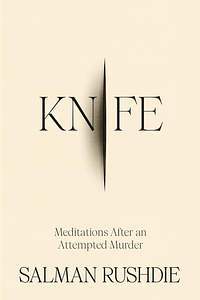Take a photo of a barcode or cover
challenging
emotional
reflective
tense
medium-paced
emotional
informative
fast-paced
Salman Rushdie was in his 70s, awaiting publication of his 21st book, and going onstage to speak about ensuring the safety of controversial writers, when a man rushed the stage and stabbed him 15 times. This is his memoir of the event and the year that followed.
Unfortunately, the premise is more interesting than the book.
He provides details of what he remembers of the attack, then details the weeks and months of recovery of physical therapy afterwards. He spends a chapter having an imaginary conversation with his attacker, making up what he would say; in this chapter you remember he's a novelist. Toward the end he pivots from his personal experience to a condemnation of letting your politics and your religion interact, and says religion is worthy of disrespect. A lifelong atheist and now a man who's been blinded and traumatized by a Muslim man, I can understand this response to his experience, but personally I hadn't found the book terribly compelling and now I soured on it toward the end.
Felt more like a journal he needed to write for his own sake in the pursuit of healing, rather than a book interesting and instructive for others to pick up.
Unfortunately, the premise is more interesting than the book.
He provides details of what he remembers of the attack, then details the weeks and months of recovery of physical therapy afterwards. He spends a chapter having an imaginary conversation with his attacker, making up what he would say; in this chapter you remember he's a novelist. Toward the end he pivots from his personal experience to a condemnation of letting your politics and your religion interact, and says religion is worthy of disrespect. A lifelong atheist and now a man who's been blinded and traumatized by a Muslim man, I can understand this response to his experience, but personally I hadn't found the book terribly compelling and now I soured on it toward the end.
Felt more like a journal he needed to write for his own sake in the pursuit of healing, rather than a book interesting and instructive for others to pick up.
emotional
"In the land of the blind the one-eyed man is king."
- Erasmus, and one of the few quotes that didn't appear in this book.
No one else could have written this book, and it's not a piece of writing you can rate so much as experience. Rushdie's writing is clear and impactful, and whatever opinions I have about his style or his approach to this memoir really don't matter. His near murder was a singular moment and his response is just as unique.
- Erasmus, and one of the few quotes that didn't appear in this book.
No one else could have written this book, and it's not a piece of writing you can rate so much as experience. Rushdie's writing is clear and impactful, and whatever opinions I have about his style or his approach to this memoir really don't matter. His near murder was a singular moment and his response is just as unique.
I really enjoyed reading Rushdie's thoughts about his own place in history and the popular mind--as well as within his own existence--decades after the dramatic turn his life took with the publication of Satanic Verses. (I have my own story about reading that extraordinary novel that, for once, I'll keep to myself.) His nonfiction prose is especially incisive.
However, reading autobiographical material by a person who is, in part, a professional celebrity can be tiresome. So much name dropping--but no, no, those are his friends, those are just the luminous circles he travels in. (In that way, it's like reading Joan Didion's autobiographical work.) Worse is the fact that Rushdie comes off as a real know-it-all. I'm no slouch academically, but having someone pull obscure literary, artistic, and historical references out of his ass like it was nothing can be infuriating. Granted, this is a written document and the author had time to ruminate about what devastatingly apt sonnet or film to refer to, although many of the references come about because something reminded him in a moment he's describing. Our author even claims to have had a dream "...that looked like Géricault's great painting The Raft of the Medusa brought to life, except the people on the raft were all Surrealists--Max Ernst, René Magritte, Salvador Dalí, Luis Buñuel, even Leonora Carrington--and they were all fighting savagely, trying to gouge out one another's eyes." What the actual fuck? Even his dreams are insufferably erudite.
However, reading autobiographical material by a person who is, in part, a professional celebrity can be tiresome. So much name dropping--but no, no, those are his friends, those are just the luminous circles he travels in. (In that way, it's like reading Joan Didion's autobiographical work.) Worse is the fact that Rushdie comes off as a real know-it-all. I'm no slouch academically, but having someone pull obscure literary, artistic, and historical references out of his ass like it was nothing can be infuriating. Granted, this is a written document and the author had time to ruminate about what devastatingly apt sonnet or film to refer to, although many of the references come about because something reminded him in a moment he's describing. Our author even claims to have had a dream "...that looked like Géricault's great painting The Raft of the Medusa brought to life, except the people on the raft were all Surrealists--Max Ernst, René Magritte, Salvador Dalí, Luis Buñuel, even Leonora Carrington--and they were all fighting savagely, trying to gouge out one another's eyes." What the actual fuck? Even his dreams are insufferably erudite.
challenging
fast-paced
emotional
inspiring
reflective
fast-paced



